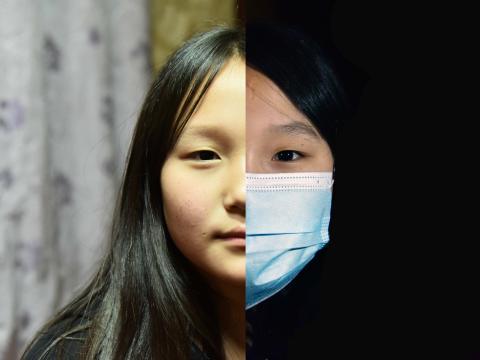Asia’s Most Vulnerable Children on the Brink due to COVID-19

Singapore, 08 July 2020 – International faith-based agency World Vision urgently calls on Asian leaders to attend and respond to the deadly long-term impact COVID-19 on Asia’s most vulnerable, especially children. The Unmasking the Impact of COVID-19 on Asia’s Most Vulnerable Children early recovery assessment report released by World Vision Asia Pacific, reveals that resulting economic, psychosocial, and physical strain on families has negatively affected all aspects of child well-being including access to food, nutrition, healthcare, essential medicines, hygiene and sanitation facilities, as well as child protection and safety.
"My mother got sick. I did not know what to do. I sneaked out with my sister, and without my parents' knowledge, we begged for money on the streets," says 9-year-old Thandar, Myanmar.
The early recovery assessment report based on data gathered across all nine countries highlighted that the livelihoods of more than 60% of parents or caregivers were fully or severely affected by the COVID-19 pandemic. The daily workers who are the largest segment in the survey (and the largest segment of many Asian economies) are the hardest hit. The loss of livelihoods that has resulted from government lockdown measures has become the top-most concern for the rural and urban poor. About 85% of urban parents/caregivers have reported the loss of jobs or income reduction in the previous weeks.
The impact of COVID-19 is threatening to reverse decades of progress in the fight against poverty and income inequalities, potentially stalling Asian economic growth at zero percent, in 2020, and putting millions of children in Asia-Pacific at increased risk. Half of the world’s most vulnerable[1] children live in Asia Pacific. “The rate of child malnutrition, physical abuse, and lack of access to proper sanitation in Asia is already high, before the onset of COVID-19 outbreak. Now, the loss of livelihood due to this pandemic is causing parents and caregivers to adopt negative coping strategies such as sending their children away to live with family or in institutions, forcing children to work, beg or even engage in illegal activities. The findings in our Recovery Assessment Report is a clarion call to all to respond to this escalating situation,” says Terry Ferrari, World Vision Regional Leader of East Asia.
Results of the report reveal that 62% of the interviewed households indicated limited access to basic food supplies due to affordability challenges. Access to adequate water and sanitation remains a challenge which increases the risk of malnutrition and the spread of the diseases, including COVID-19. The stress on families related to loss of income, lack of school, change of children’s behaviour and quarantine measures contributes to children experiencing physical punishment and emotional abuse. The report also indicates that 26% of children confirmed that caregivers had used physical or psychological punishment. In Bangladesh, over 33% of children are likely at risk of engaging in high-risk activities or jobs to survive.
Lara Villar, Senior Director of Operations, Ministry Impact and Engagement of World Vision Asia Pacific, said “The impact of COVID-19 is massive. In Asia Pacific region, the average monthly income per household has dropped from USD $135 a month to USD $35. This brings families back to extreme poverty. The consequences that these numbers have on all dimensions of child well-being are heartbreaking. These are people that were just out of poverty, and are now, fully back on it.”
While the potential longer-term effects on the global economy and individual countries are dire, World Vision calls on relevant authorities to prioritise the most vulnerable people and countries in Asia by providing intense socio-economic and technical support. The report offers short, medium, and long-term recommendations for government, multi-lateral and implementing partners to meet the needs of vulnerable children and protect them from diseases, including all forms of violence.
World Vision, as a Christian relief and development agency, in coordination with the governments and local partners, began responding to the needs of children and families in APAC since early February 2020. World Vision continues to respond this is global crisis by providing access to food and nutrition, protection, education, livelihood for children and families. Cash and voucher approaches are maximised to empower families and support recovery. As of 2 July, World Vision has reached over 8,200,000 people, including 3,900,000 children in Asia Pacific.
ENDS.
[1] ‘Most vulnerable children are children whose quality of life and ability to fulfil their potential is most affected by extreme deprivation and violations of their rights. These children often live in catastrophic situations and relationships characterized by violence, abuse, neglect, exploitation, exclusion, and discrimination’
Note to editor
The Unmasking the Impact of COVID-19 on Asia’s Most Vulnerable Children early recovery assessment analysis, is a compilation of survey data from over 26,000 people in 335 communities across nine Asian countries: Bangladesh, Cambodia, India, Indonesia, Mongolia, Myanmar, Nepal, Philippines, Sri Lanka.
Read the full report here: https://www.wvi.org/publications/coronavirus-health-crisis/unmasking-impact-covid-19-asias-most-vulnerable-children
For further information or to organise an interview please contact:
Crislyn Felisilda
Regional Public Engagement Manager, World Vision Asia Pacific
Mobile/Whatsapp: +639178036974
Email: crislyn_felisilda@wvi.org
Skype: crislyn.felisilda
World Vision is a Christian humanitarian organisation dedicated to working with children, families, and their communities to reach their full potential by tackling the root causes of poverty and injustice. World Vision serves all people, regardless of religion, race, ethnicity, or gender. For more information, please visit www.wvi.org/asiapacific or follow us on Twitter @WVAsia